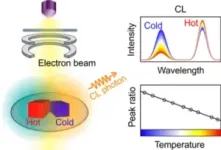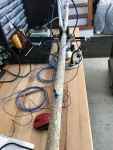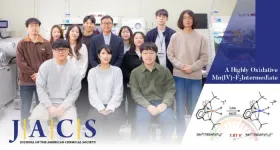(Press-News.org) A groundbreaking method for measuring the temperature of nanometer-sized samples within a transmission electron microscope (TEM) has been developed by Professor Oh-Hoon Kwon and his research team in the Department of Chemistry at UNIST. This innovative technology, utilizing nano-thermometers based on cathodoluminescence (CL) spectroscopy, opens up new possibilities for analyzing the thermodynamic properties of fine samples and advancing the development of high-tech materials.
The transmission electron microscope allows researchers to observe samples at a magnification of hundreds of thousands of times by transmitting a short-wavelength electron beam through the sample. By detecting light emitted from the sample through cathode ray emission spectroscopy, researchers can finely analyze the physical and optical properties of the sample at nanometer scales.
The newly developed nano-thermometers rely on the temperature-dependent intensity variation of a specific cathode ray emission band of europium ions (Eu3+). By synthesizing nanoparticles doped with europium ions within gadolinium oxide (Gd2O3), the research team ensured minimal damage from the electron beam, enabling long-term experiments.
Through dynamic analysis, the team confirmed that the intensity ratio of the light emitting band from europium ions is a reliable indicator of temperature, with an impressive measurement error of about 4℃ using nano thermometer particles measuring approximately 100 nanometers in size. This method offers more than twice the accuracy of conventional TEM temperature measurement techniques and significantly improves spatial resolution.
Furthermore, the team demonstrated the applicability of the nano-thermometers by inducing temperature changes with a laser within the TEM and simultaneously measuring temperature and structural variations in real-time. This capability allows for the analysis of thermodynamic properties at the nanometer level in response to external stimuli, without interfering with standard TEM analysis procedures.
Won-Woo Park, the first author of the study, emphasized the non-invasive nature of the temperature measurement process, highlighting that the interaction between the transmission electron beam and the nano-thermometer particles enables real-time temperature detection without disrupting TEM imaging. He noted, “The big advantage of the developed nanometer is that the temperature measurement process does not interfere with the existing transmission electron microscope analysis,” adding, “Since temperature is measured using light, a by-product generated by the interaction between the transmission electron beam and the nanometer particle, it is possible to measure the image of the transmission electron microscope and detect the temperature in real time.”
Professor Kwon underscored the significance of this research, stating that “The developed temperature measurement indicators, when combined with real-time imaging techniques, facilitate the observation of local temperature changes in response to external stimuli.” He further stated, “This advancement is poised to significantly contribute to the development of high-tech materials such as secondary batteries and displays.”
The findings of this research have been published in the online version of ACS Nano on January 30, 2024. This research was made possible with the support of the Samsung Science and Technology Foundation.
Journal Reference
Won-Woo Park, Pavel K. Olshin, Ye-Jin Kim, et al., “Nanoscale Cathodoluminescence Thermometry with a Lanthanide-Doped Heavy-Metal Oxide in Transmission Electron Microscopy,” ACS Nano, (2024).
END
Nanoscale CL thermometry with lanthanide-doped heavy-metal oxide in TEM
2024-03-07
ELSE PRESS RELEASES FROM THIS DATE:
Veteran PTSD fishing treatment project nets $1.3m in funding
2024-03-07
A “game-changing” $1.3m cash injection has been awarded to researchers exploring if doctors can prescribe fishing to treat PTSD.
The vital funding will allow the University of Essex’s Dr Nick Cooper and collaborator Dr Mark Wheeler to expand their influential work which has helped hundreds of military veterans.
Now the Department of Psychology’s Dr Cooper will explore if casting a rod from the bankside can aid police officers, paramedics, firefighters, and the coast guard deal with trauma.
Taking place over the course of three and a half years the National Institute for Health and Care Research-funded ...
Too few caregivers and too many patients – a bad combination for elderly in rural areas
2024-03-07
Ageing baby boomers are swelling the ranks of elderly across the Western world, with Norway no exception.
We know Norway's elderly population will increase, and it's likely there will be far fewer healthcare professionals to take care of them. The last 20 years has seen the population of Norwegians over the age of 80 increase by 40,000; the percentage of people aged 67-79 has grown by 37.9 per cent over the last 10 years.
Over the next 20 years, there will be 250,000 more Norwegians over the age of 80.
The ageing crisis has been predicted for ...
Earth’s earliest forest revealed in Somerset fossils
2024-03-07
The oldest fossilised forest known on Earth – dating from 390 million years ago – has been found in the high sandstone cliffs along the Devon and Somerset coast of South West England.
The fossils, discovered and identified by researchers from the Universities of Cambridge and Cardiff, are the oldest fossilised trees ever found in Britain, and the oldest known fossil forest on Earth. This fossil forest is roughly four million years older than the previous record holder, which was found in New York State.
The fossils were found near Minehead, on the south bank of the Bristol Channel, near what is now a Butlin’s holiday ...
European Lung Cancer Congress 2024
2024-03-07
Lugano, Switzerland, 07 March 2024 – The European Lung Cancer Congress 2024 is the annual appointment that brings together various experts in the field of thoracic oncology, including thoracic surgeons, respiratory physicians and pneumologists, medical and radiation oncologists, interventional radiologists and pathologists, to discuss the latest insights into the recent developments in the prevention, diagnosis and treatment of lung cancer.
The event will take place in Prague, Czech Republic, and through a dedicated ...
Pinging pipes could help to identify lead water lines without excavation
2024-03-07
As any percussionist or fidgety pen-tapper can tell you, different materials make different noises when you hit them. Researchers at Drexel University hope this foundational acoustic phenomenon could be the key to the speedy removal of lead water lines that have been poisoning water supplies throughout the country for decades. A recent study conducted with geotechnical engineering consultant Seaflower Consulting Services, showed that it is possible to discern a buried pipe’s composition by striking ...
A new manganese-fluorine catalyst with exceptional oxidizing power
2024-03-07
A research team, affiliated with UNIST has unveiled a cutting-edge catalyst with exceptional oxidizing power, capable of extracting electrons from compounds. Anticipated to revolutionize various fields, including the development of metal catalysts and synthetic chemistry, this catalyst marks a significant breakthrough in catalytic research.
Led by Professor Jaeheung Cho in the Department of Chemistry at UNIST, the research team successfully synthesized the pioneering manganese-fluorine catalyst, utilizing the Macrocyclic Pyridinophane System. This catalyst demonstrates the ability to induce oxidation reactions, ...
An aspirin a day? Poll of older adults suggests some who take it may be following outdated advice
2024-03-07
One in four older adults take aspirin at least three times a week, mostly in hopes of preventing heart attacks and strokes, a new poll shows.
But many people aged 50 to 80 who said they take aspirin may not need to, the findings from the University of Michigan National Poll on Healthy Aging suggest.
In all, 57% of people aged 50 to 80 who say they take aspirin regularly also said they don’t have a history of cardiovascular disease. Such people should have a conversation with their health care provider about what’s best for them before stopping or starting aspirin use.
National guidelines have changed in recent years for using aspirin for prevention, ...
What makes a pathogen antibiotic-resistant?
2024-03-07
Antimicrobial resistance is a story of constantly moving parts and players. With every new or tweaked antibiotic or antimicrobial drug, the targeted pathogens begin the evolutionary dance of acquiring resistance, prompting researchers to constantly develop workarounds or entirely new classes of medicine.
Understanding the underlying mechanisms of acquired antimicrobial resistance is critical to the fight, a case of knowing one’s enemy. In a new paper published March 2, 2024 in npj Antimicrobials and Resistance, part of the Nature Portfolio, researchers at Sanford Burnham Prebys, working with Roche Pharma Research and Early Development, ...
Method rapidly verifies that a robot will avoid collisions
2024-03-07
Before a robot can grab dishes off a shelf to set the table, it must ensure its gripper and arm won’t crash into anything and potentially shatter the fine china. As part of its motion planning process, a robot typically runs “safety check” algorithms that verify its trajectory is collision-free.
However, sometimes these algorithms generate false positives, claiming a trajectory is safe when the robot would actually collide with something. Other methods that can avoid false positives are typically too slow for robots in the real world.
Now, MIT researchers have developed a safety check technique which can prove with 100 percent accuracy ...
Eating habits, physical activity practice and clinical prognosis of colorectal cancer patients with overweight/obesity
2024-03-07
Background and objectives
Obesity is a chronic metabolic disease associated with the development of several other diseases, including cancer. The present study aims to evaluate the eating habits, physical activity, and clinical profiles of colorectal cancer (CRC) patients with overweight/obesity.
Methods
A cross-sectional study was conducted with data collected from the medical records of patients diagnosed with CRC (n = 41) from June 2019 to June 2022. Additionally, a questionnaire (n = 35) was applied to gather information on eating habits and physical activity. The data were ...







